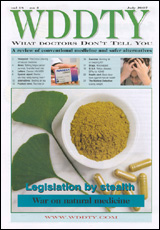| | What Doctors Don't Tell You: MMR AND AUTISM | |
Many E-news readers were very confused to read in last week's broadcast that a link between the MMR vaccine and autism had definitely been established when the media was stating the exact opposite.
In fact the whole nation should have been perplexed had the media done its job properly. Our story was based on a study of 537,304 children in Denmark - which was ignored by the entire media - while the headline-grabbing study was based on a review of 5,763 children.
The later study, which appeared in last Saturday's Lancet, could find 'no convincing evidence' of a link between the vaccine and autism. They compared the records of 1,294 children who had autism or a PDD (pervasive development disorder) with 4,469 children who did not have autism. Overall, 78 per cent of the autism group had received the MMR injection, while 82 per cent of the non-autism group had been given the triple jab. The 4 per cent difference was not significant, said lead researcher Dr Liam Smeeth of the London School of Hygiene and Tropical Medicine.
A Department of Health spokesman, who was also widely quoted, said: "The study is in full agreement with other international studies carried out in different ways, by different researchers, in different countries."
This presumably excludes the significant study we referred to last time. It's significant because it is based on the largest group of children ever analysed, and it was the same group used by the Madsen study team which found no link, and which was used ever after by government agencies around the world. Madsen's data was reanalyzed, and the age group of the children was extended to five years and older, the year when autism is first diagnosed in Denmark. The Madsen team had stopped looking after the child was older than four years, so it's not surprising that his team was unable to find many autism cases.
All of this leaves a nasty taste, and it feels that we're still playing propaganda rather than science. Nobody has commented on the later Danish study, nor has anyone satisfactorily answered other questions that remain hanging, such as:
--The 1992 mass vaccination programme in the UK was followed a year later by a sudden rise in autism levels. Why?
--A further mass vaccination campaign in late-1994 heralded another sudden and steep rise in autism figures throughout 1995 and 1996. Why?
--The second round of MMR vaccinations was carried out in the autumn of 1996. Again, autism levels rose dramatically in 1997. Why?
For us, and for many thinking parents, the latest Lancet study does not mean 'game over', no matter how many times the media insists that it is. For us, vital questions remain unanswered. While governments are fast and loose with the facts just to get patients back in line for vaccinations, we fear these questions will never be answered satisfactorily.
 | What Doctors Don’t Tell You is one of the few publications in the world that can justifiably claim to solve people's health problems - and even save lives. Our monthly newsletter gives you the facts you won't......more |
|
|
Popular Related Articles/Areas
Popular & Related Products
Popular & Featured Events
Dimensions of Wellness
|
|